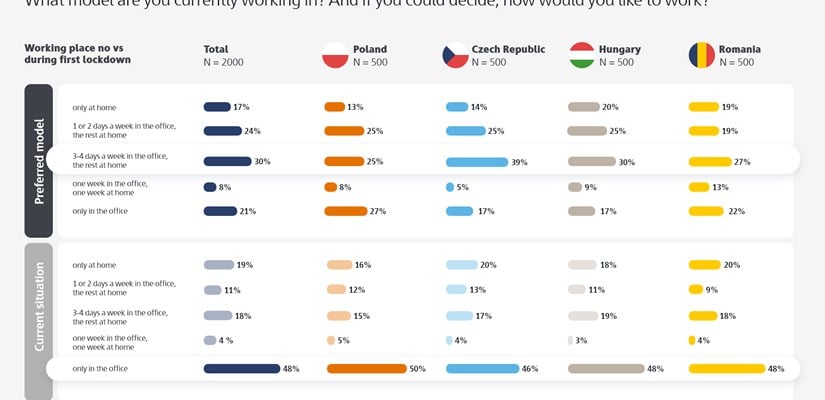
The study presents an analysis of employees’ answers in four countries in Central and Eastern Europe – Poland, the Czech Republic, Romania and Hungary. Its main aim was to gather data concerning, among others, the perspective of the employees in terms of their workspace conditions and thus, the future of office spaces.
Top choice: hybrid model with office work dominating
The survey shows that the home office is not an ideal solution in the eyes of employees when it comes to CEE in general – there are more people who would prefer to work only from the office in comparison to those who prefer only home office. Nowadays, nearly half of all employees work in the office every day (48%). As it turns out, however, the region is heading towards a hybrid model with office work dominating – every second respondent (51%) when asked for their ideal working model said that they would like to work in the office at least 3-4 days a week. This tendency is especially visible in the Czech Republic (56%) and Poland (52%).
Offices need to offer more than before
The necessity to switch to a home office has naturally changed the daily routine for many people. The most advantageous aspects of remote work include the ease of organizing family life, good working conditions, and saving time on commuting to the office. Most employees said that the home office allows them to organize their family life easier (51%). The second most important factor that CEE respondents appreciate in remote work are good working conditions at home (48%) and thirdly they mention saving time as a result of not having to commute to the office (45%).
– The pandemic has somehow outlined the future of office spaces and the evolving needs of employees. We can see that people still prefer going to the office, as more than half of the respondents claim they would like to work in the office nearly full-time. However, in the post-pandemic era offices will have to offer more than before – they should be better, more comfortable and interesting than what we have at home, says Arkadiusz Rudzki, Executive Vice President for Leasing & Sales at Skanska commercial development business unit in CEE.
Desired office: comfort, safety and good IT connection
Taking into account the responses from surveyed countries, the most important motivator to work in the office is a quiet workplace allowing concentration (31%). Other crucial aspects include, among others, high standards (29%) and possibility to work in a closed room in the office, i.e. not an open space (25%). Moreover, among the top three indicators of an ideal office are: very good IT equipment (mentioned by 34% of the respondents), proper lightning (32%), food service with high-quality meals (29%), and individual rooms for work (28%).
– These expectations will transform the approach to managing office buildings with a growing focus on hospitality aspects. Therefore, we are heading towards high quality spaces with maximum flexibility as only the most outstanding buildings will be able to attract companies and fulfil their needs. This includes providing various types of spaces, e.g. a quiet place for work which requires concentration, spaces dedicated to creative work or simply socializing with the team, and services in the building – also directly on occupiers' premises – such as cafeterias, gaming rooms, yoga or pilates classes. What’s more, we will be observing the growing importance of additional solutions, such as concierge services in the buildings – something that a few years ago was perceived as a novelty and a big distinguishing factor on the market, will soon become a standard, adds Arkadiusz Rudzki.
– More than half of employees would like to spend at least 3 days a week in the office. The desire to be in the office is mainly due to the possibility of working in peace and quiet. If we gave all office employees the opportunity to work in a high-standard building, they would most appreciate access to high-class IT equipment, professional lighting that does not tire the eyes (this is especially important for Czechs) and access to restaurants with healthy food. Among the features of an ideal office, employees also mention rooms for exclusive work and green areas around the office enabling both work and rest (mentioned most often by Romanians), says Małgorzata Głos, partner in the research and analytical company Zymetria.
The study also confirms the great importance of safety issues. The results show that high sanitary standards can encourage working in the offices, while lack of them causes fear of contracting the virus. Daily disinfection of the office (41%), lower population density (37%) and non-contact solutions (37%) are the main factors that would positively affect employees’ sense of safety in the office.
About the study:
The study was conducted by the research and analytical company Zymetria on behalf of Skanska, the biggest office developer in Europe. As part of the quantitative online survey using the CAWI method, responses were collected from 2,000 office workers living in large cities in four countries – Poland, Romania, the Czech Republic and Hungary.